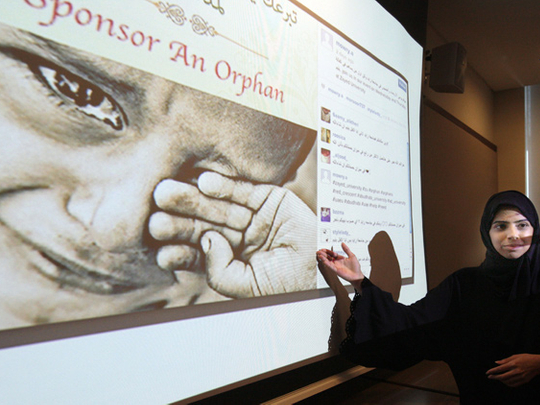
Abu Dhabi: Initially the goal was to simply get good grades for their course. But as a group of four Emirati students conducted a bake sale at their university to help orphans, they realised that they wanted to do much more for the disadvantaged children of the world.
Their efforts, which culminated in a two-day fund collection and sponsorship campaign at Zayed University, raised a whopping Dh93,600 and will now help support 39 orphans for an entire year.
“The aim of the project, part of our Communications course, was to use our skills to help the community in some way. As we were brainstorming, we came across a video of a young girl on YouTube who had lost her parents, and we saw her delight at receiving a pair of new shoes, something most of us take for granted,” Sarah Jumaan, a 20-year-old pursuing a major in Finance at the university, told Gulf News.
Sarah and her classmates, Noora Madhi, Amerah Ali and Fatima Al Hammadi, chose to participate in one of the university’s bake sales. This yielded Dh2,200, but the girls found that they were not satisfied.
“We learnt that it takes Dh2,400 for the Emirates Red Crescent (ERC) to sponsor an orphan for an entire year. And we wanted to help more than just one orphan,” Amerah said.
So the first-year students began to look for a more effective fund-raising strategy.
After contacting the ERC, the group were able to get a set of forms that enable each donor to support an orphan through a Dh200 contribution made every month for a year. They set up a booth at the university, and sent out a series of mails to their peers telling them about the welfare campaign. On the day, they also placed a donation box for those wanted to contribute smaller amounts.
The initiative lasted for two days, and the response was overwhelming. One of the innovative elements that encouraged donations was a board where the amount collected was regularly updated, including the number of children that the funds would help.
“Every time donors realised that a little more money would help fund another orphan, they began to contribute in droves,” Sarah said.
“We eventually ran out of forms, and had to contact the ERC to get more. And the reach of our campaign through social media meant that we also received orphan sponsorship requests from other universities in Abu Dhabi,” Noura added.
The money has now been handed over to the ERC, who will distribute it among orphans in Egypt, Algeria and Palestine.
But the impact of the campaign is still being felt.
“Many of the students were unaware that the ERC runs an orphan sponsorship initiative, and are interested in continuing the efforts,” Noora said.
The students said they too would consider organising further charity schemes.
“Perhaps we will look to collect funds for the orphans within the UAE next,” Amerah added.
Robyn Albers, their course instructor, agreed that students often continue undertaking welfare initiatives even after they have completed the course project.
“Last semester, a group decided to distribute a basket of fruit to workers who toil in the heat, and I know that many of them still continue the practice,” she said.
Another notable project conducted this semester has seen a group of the university’s students collect Dh30,000 to provide relief for inmates in the UAE and their families.












